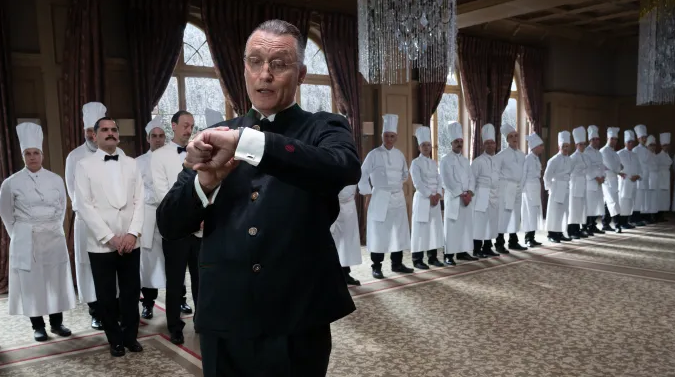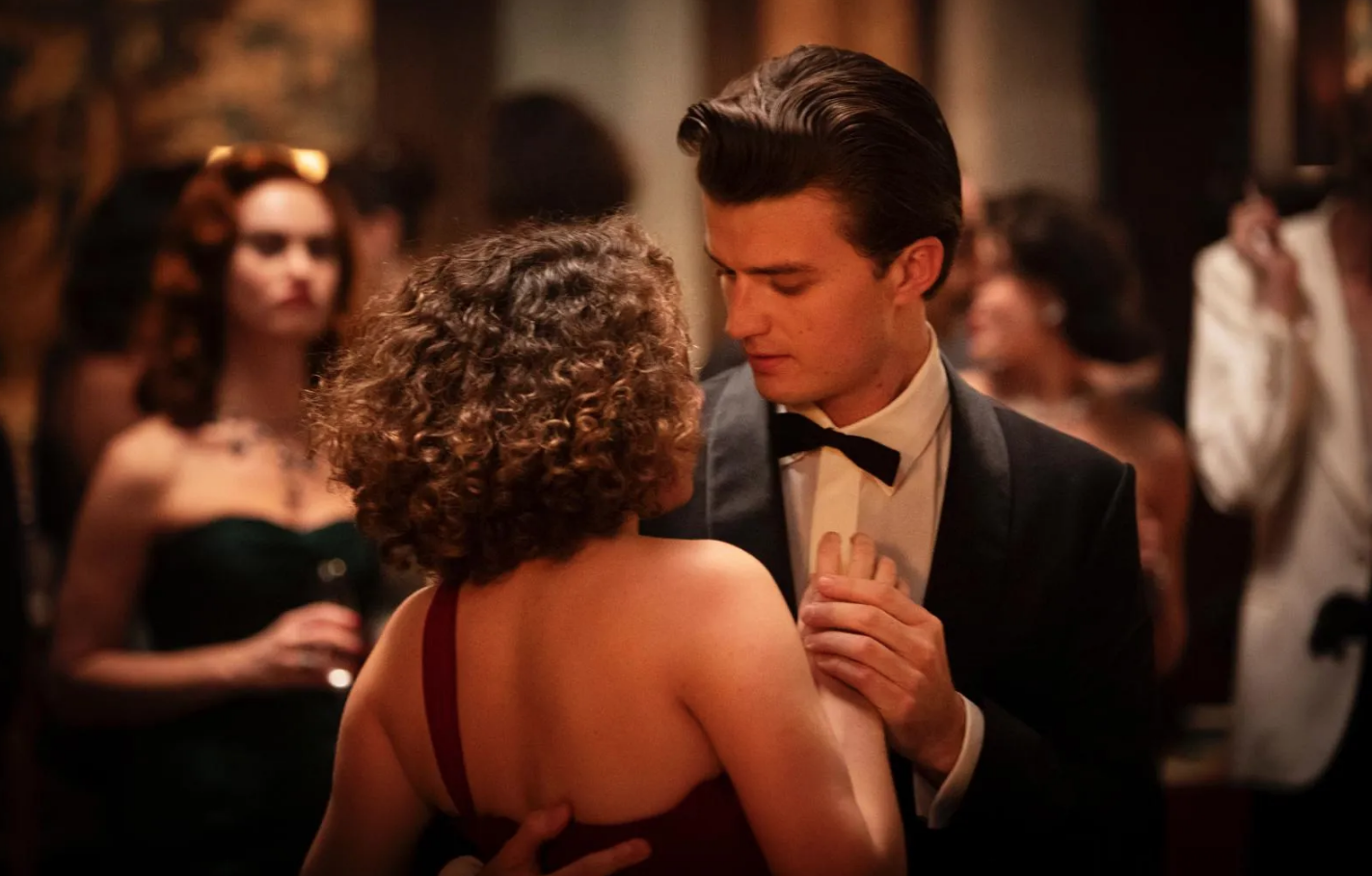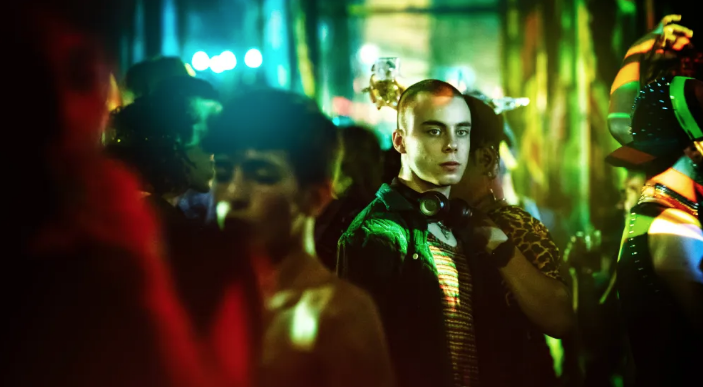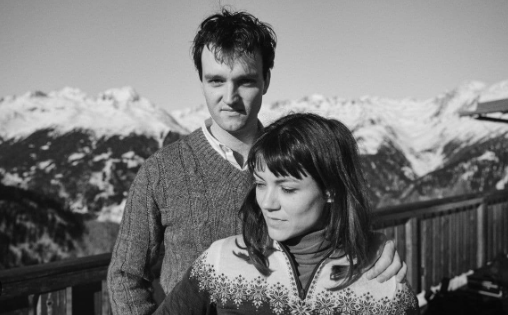Venice 2023: Roman Polanski's "The Palace" and more...
 Monday, September 4, 2023 at 11:41AM
Monday, September 4, 2023 at 11:41AM by Elisa Giudici
 "The Palace"
"The Palace"
Venice is experiencing an absence this year: the middle-ground movies. While there are some mind-blowing films and quite a few terrible ones, those good yet imperfect titles are notably missing. This 80th edition of the festival has been quite the rollercoaster, with moments of brilliance followed by real disappointments. Some movies have sunk so low that they become oddly memorable. Let's take a closer look at a few of the disappointments witnessed in Venice recently.
THE PALACE by Roman Polanski
It might be too early to pass judgment, but Polanski's latest film is a disaster of such magnitude that I hope the title of the worst movie in competition won't fall to an Italian entry...
As expected, The Palace falls into the ever-popular genre of comedies depicting rich people as dreadful individuals. I wasn't a fan of Triangle of Sadness at Cannes, and believe it or not, The White Lotus didn't win me over. Now, The Palace has somehow managed to make me appreciate both more in retrospect.
It's evident that Polanski had limited resources for this film, set on New Year's Eve in the year 2000 at a luxurious Swiss Alps hotel. Let's just say the digitally generated effects match the film's era. From cinematography to direction, The Palace strives to make the most of its constraints, but it never quite shakes off the feeling of watching an old TV movie produced by a small network.
The film's subpar visuals match the muddled silliness of its writing. The Palace aims to be a satire of the bad taste and poor manners of the wealthy, all against the backdrop of the looming Millennium Bug. However, it's riddled with loose ends. The choice of that particular moment in time remains unclear, and several storylines are left unresolved and unexplained. Notably, Mickey Rourke's character, a shady businessman in financial trouble, is at the heart of not one but two subplots that are left dangling.
If you were anxiously anticipating yet another movie resorting to waste and vomit for comic relief, consider yourself fortunate. But if you were hoping for a coherent satire of the excesses and bad behavior of the affluent, you'll need to look elsewhere. The Palace is a significant misstep for Polanski.
 "Finally Dawn"
"Finally Dawn"
FINALMENTE L’ALBA by Saverio Costanzo
Saverio Costanzo had a remarkable chance to create a film with broad international appeal. Originally, Finally, Dawn was intended to depict the last day of Wilma Montesi, a young woman with dreams of becoming a movie star. Tragically, her life ended in mysterious circumstances, drawing eerie parallels to the infamous Black Dahlia case, earning her the moniker "the Italian Black Dahlia."
The concept held great promise – a film set against the backdrop of Cinecittà during the golden age of peplum, featuring a murder that exposed the dark underbelly of Italian cinema. The narrative included the death of a starlet and the involvement of influential politicians, making it seem like barely hidden cinematic gold waiting to be found.
So it remains puzzling why Costanzo chose to transform Montesi's true story into a fictional tale. Instead of focusing on the tragic last day of Montesi, the film veers into the story of a young, naive, and less conventionally attractive working-class Roman girl. She embarks on an extraordinary adventure in Cinecittà, following a glamorous star (Lily James), her on-screen partner (Joe Keery), and a mysterious character (Willem Dafoe) through a wild night that leads to the very villa where Wilma met her unfortunate end a few days earlier.
The initial promise of Finally, Dawn is reminiscent of My Brilliant Friend, but it evolves into an Italian version of Babylon. Sadly, this transition is poorly executed. The film's first act shows potential, but the second part is marred by nonsensical plot twists and absurd scenes. The final scene involves one of the most absurd "metaphorical" scenes I've ever witnessed, which I can't help but attribute to Paolo Sorrentino's influence, given his penchant for inserting CGI-generated exotic animals into the Roman landscape.
What's most frustrating is the film's exorbitant budget of 28 million euros, a staggering sum for Italian cinema. To provide context, Comandante, which included a submarine reconstruction, cost a comparatively modest "only" 14 million euros. Regrettably, this substantial investment has had little to no positive impact on the final result.
 "Adagio"
"Adagio"
ADAGIO by Stefano Sollima
Adagio isn't a bad movie, but it would surely have fared better as an out-of-competition title. This year, we have six Italian films competing, and Adagio feels like an epilogue, a pleasant but ultimately inconsequential addition to the "Romanzo Criminale" series. It's been nearly two decades since Michele Placido's successful series chronicled the Roman criminal syndicate, Banda della Magliana.
The title Adagio doesn't quite capture the high-paced narrative of a single night when Rome is on fire (quite literally). During this tumultuous night, a young boy finds himself entangled in a perilous web involving corrupt police officers, a dubious politician, and his own father—a former member of the Magliana gang who's losing his grip on reality.
Once again, Rome plays a central role, revealing its decay, flaws, and unsightly aspects. It serves as the bleak backdrop to yet another crime story, a hallmark of Sollima's filmmaking. Yet, within this darkness, the film manages to find a glimmer of hope, effectively marking the end of the legacy of Italy's "anni di piombo" or "years of lead" in the 1970s.
Adagio at least shines yet another spotlight on the immense talent of Pierfancesco Favino, who also stars in the opening movie, Comandante. His portrayal here as a lowlife criminal known as "The Camel" is nothing short of mesmerizing. The way he meticulously controls his body and voice is truly captivating.
 "The Theory of Everything"
"The Theory of Everything"
THE THEORY OF EVERYTHING by Timm Kröger
Finally, we have a captivating failure or a flawed gem (?) in Timm Kröger's second feature-length film. Shot in captivating black and white, a trend seen in many Venice entries this year, The Theory of Everything presents a science fiction narrative that delves into the concept of the multiverse within the context of 1930s noir cinema.
This film represents a prime example of a remarkable creation that ultimately spirals out of control due to the director's struggle to harness and channel his evident talent. Kröger astonish the audience with audacious shots that appear technically challenging. The Theory of Everything unfolds in the Swiss Alps, just like the Polanski, only this time during a quantum physics conference. The protagonist is a cult sci-fi book author on a quest to find a woman named Karin. As expected, the timeline becomes quite intricate, and coherence slips away.
One noteworthy highlight is a fantastic fictional movie within the movie, which I personally adored. It's an Italian film adaptation of the novel written by the protagonist, brought to life by the fictional director Giorgio Giovannoni. We catch a glimpse of this cinematic gem, and it effortlessly transports us to the realm of Italian science fiction from the 1960s.
More Reviews from the the 80th Venice Film Festival



Reader Comments (4)
Wow, I've read some bad responses for The Palace but... damn... I haven't seen everything by Polanski and I've liked pretty much what I've seen from him so far but... wow... is it easy to say it's his worst?
So The palace is worse than "Che? (1972)" ?
I’m sad to hear The Palace isn’t any good! I was really looking forward to it and hoping for one final great film from Polanski to add to his list of other truly great films. I will probably skip it now (if I’m even allowed the choice to watch it considering our choice to watch it in this country was taken away from all of us for his last film).
Venice 2023 is buzzing with excitement, especially for 'The Palace' by Roman Polanski. I've found capcut mod apkto be a fantastic editing tool for capturing the magic of such cinematic experiences. Thanks for sharing this update!